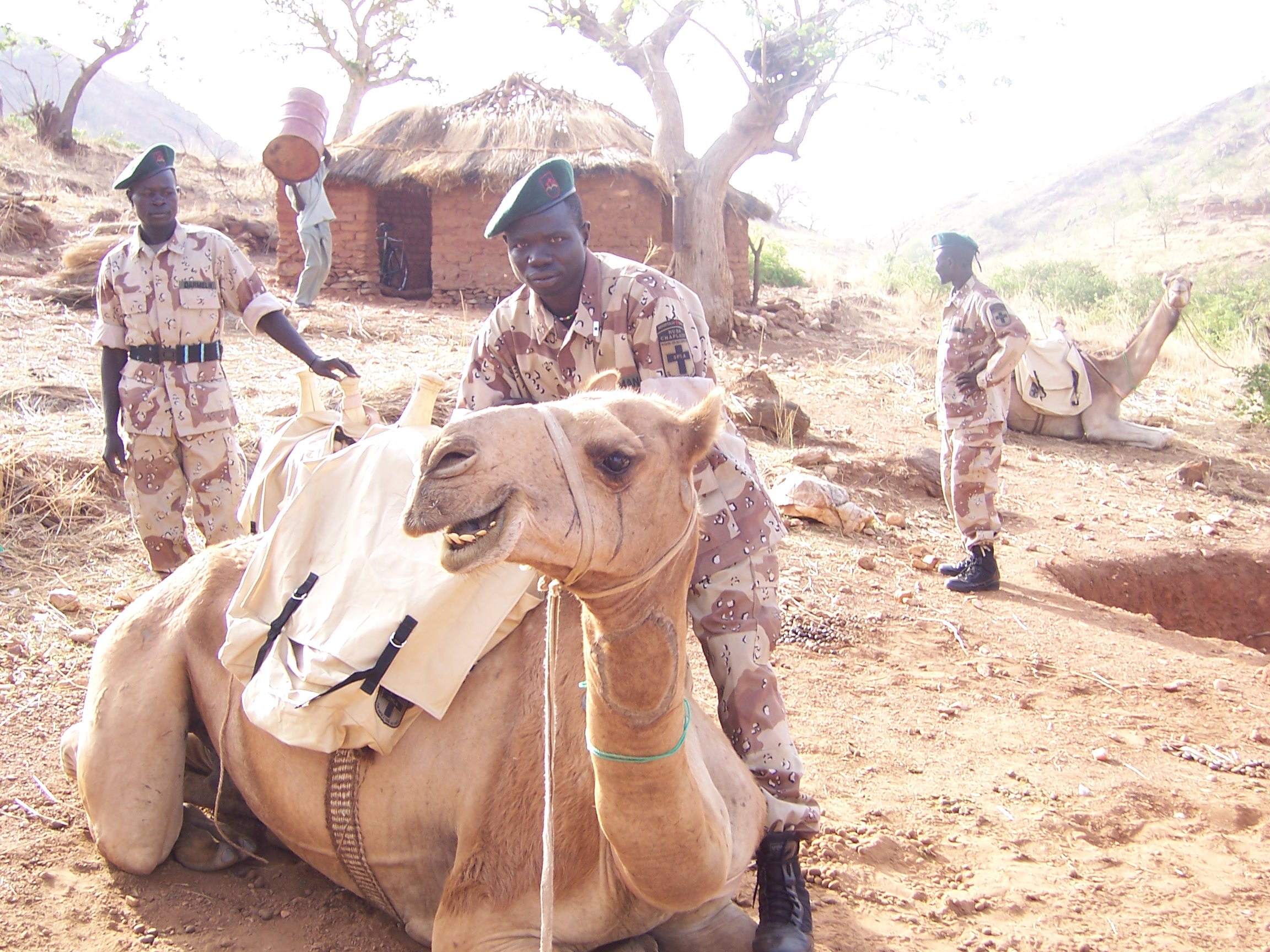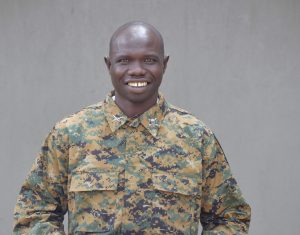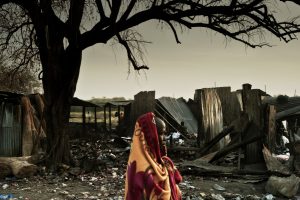
FRM Newsletter
May 2017: Into the Lion’s Den
View the full May 2017 Newsletter here.
Emmanuel, first came to us in 2003. He served as a Nubian chaplain and as a member of the Camel Corps. For the last 14 years, he has been serving the Lord as a truly exceptional chaplain. Riding across the expansive Nuba region, he takes the Gospel and the Jesus film from village to village, amidst war and ongoing hostility from the government. Christians are hated by radical Islamic extremists. Churches are targeted and burned to the ground regularly.
Along w ith his fellow brothers, in the Nuba Corps, he vigilantly stands with the believers against the tyranny. They send teams to guard the grounds where buildings are being raised from the ashes. The chaplains told me that they are committed to rebuild every church attacked, so that the region will know God is alive and cannot be killed by terrorists.
ith his fellow brothers, in the Nuba Corps, he vigilantly stands with the believers against the tyranny. They send teams to guard the grounds where buildings are being raised from the ashes. The chaplains told me that they are committed to rebuild every church attacked, so that the region will know God is alive and cannot be killed by terrorists.
Emmanuel was transferred by the military to Yei, a city in Southern Sudan, where a new rebel group had sprung up, killing and abducting civilians. The rebels thrive on raping women and the rape is often repeated everyday by multiple rebels. It appears that the rebels are devoid of any compassion for the suffering that they inflict. As I am sure you can imagine, for women, this is a painful and humiliating fate.
Last year in Yei, two women were abducted by a rebel patrol while out collecting firewood. As soon as news of this kind reaches a village; fear, dread and doom erupts with outbursts of wailing and sobbing from family members and friends. Children also break down; doubtful they will ever see their mothers again. Worse yet, if their mother does return, will there be anything left of her after enduring long periods of rape and torture?
When Emmanuel was informed of the abduction, he immediately went into prayer, knowing only God could intervene and help these women. Emmanuel sensed God calling him, personally, to go after the abductors and to get the two women back—he was determined to save them.
Emmanuel told me that he didn’t tell his wife of his risky plan because he knew, emotionally, she would not be able to handle her own fear and insecurities regarding the danger he was putting himself in. He told her it was just a routine mission, and to him it was. She, like all military wives in Sudan, is used to her husband participating in dangerous missions. He told a few of his fellow chaplains his plan. He asked them to pray, and if he did not return in a week, that they were to inform his wife that he had been killed trying to save these women. He was willing to enter the lion’s den, because he knew God was with him.
Most of us know the testimony of Daniel being delivered from the hungry lions in their den. We are inspired and challenged by Daniel’s godliness, especially his purity of heart. His “friend,” the king, was tricked into sentencing Daniel to be fed to the lions. There, at the edge of the pit, the king looked down upon Daniel and said, “The God you serve continually will deliver you!” Daniel knew the lions were bred for ferocity. He had seen with his own eyes that their singular objective was to fill their stomach; they cared not, what or who was on the menu. Daniel also knew that he was walking in the Truth without guile or hypocrisy. God gave him divine peace as he spent the whole night with the ravenous lions. Knowing God was on his side, and that it is impossible for God to fail, Daniel rested.
Knowing the danger Emmanuel faced, but understanding that he serves a mighty God, he was determined to find the two women, Emmanuel traveled deep into the bush. He continued searching, for several days and nights. Finally, he found the rebel camp and entered in.
Emmanuel caught the rebels by surprise, as they did not expect anyone to come after them so far into the bush. They expressed their anger by tying Emmanuel so tightly that the rope left burn marks on his arms and legs. Even though he had come to the rebel encampment on his own free will, he was taken captive and tortured.
He was put in confinement with the two women. They could hear the men talking about killing them. The women were extremely fearful, but Emmanuel told them not to be afraid, but to pray instead. Together, they prayed with every breath they took. Suddenly, a heated argument broke out among the rebels. Some of the rebels demanded that Emmanuel and the women be killed, while the remaining ones tried to talk everyone down.
Emmanuel blurted out, “Please let me speak to your commander.” He went on to say, “If, after I speak to him, you still want to kill us, then you may kill us.” Miraculously, the  rebels decided to fill Emmanuel’s request and he was ushered into the commanding officer’s quarters.
rebels decided to fill Emmanuel’s request and he was ushered into the commanding officer’s quarters.
Given the wisdom and the words to share with the rebel commander, Emmanuel told him why he had searched for the camp. Then, he went on to explain what a chaplain does, as a pastor, in a frontline unit. He closed by saying that he understood his own great personal risk by attempting to rescue the women, but God had called him to this mission. He finished by quoting Christ’s own words in John 15:13, “Greater love has no man than this, that he lay down his life for his friends.” The commander was so taken by Emmanuel’s bravery that he listened to the Gospel message, then he apologized, thanked him and agreed to release them. He then ordered his soldiers to escort Emmanuel and the two women safely out of rebel-held territory. Emmanuel completed his mission by returning each woman to her family.
Long after this event had occurred, when he arrived at the chaplains’ base, it was evident that he had taken a beating. His arms had dark stripes that still bore witness to his sufferings. Paul said in Galatians 6:17, “Henceforth, let no man trouble me, for I bear in my body the marks of the Lord Jesus.” The burn marks from being bound are still very evident months later. I suspect Emmanuel will bear them for the rest of his life. Much in the same way as those who have been killed for the Gospel, who wear the robes of the martyrs, Emmanuel too, will receive a crown for his service in eternity. I doubt Emmanuel even realizes that his scars are a mark of honor. To him, they serve as a reminder that the Lord was with him as he walked into the valley of the shadow of death.
Wes Bentley
Far Reaching Ministries